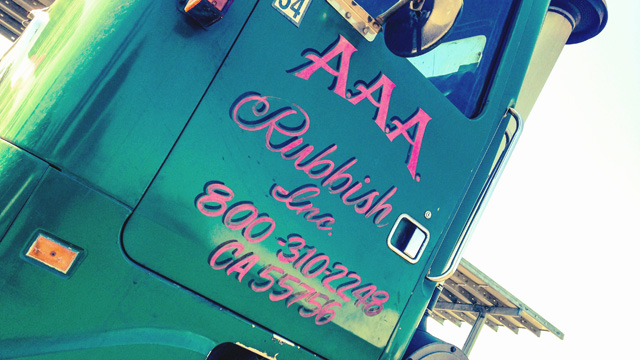“You also have varying levels of recycling, and so some buildings will actually be contributing to improving our environment and dependence on landfills and others will not, and this will guarantee that there are standards across the board,” says Cornejo.
Under the Zero Waste Plan, L.A. will be carved into 11 "exclusive franchise" zones, meaning one hauler will be awarded a city contract through a competitive bidding process to work one zone.
Haulers will also have to abide by strict trash-handling recycling rules. Right now L.A. diverts about 75 percent of its waste from landfills through recycling. That’s actually ahead of most other big cities in California, but it's short of the 90 percent diversion goal L.A. hopes to attain within a decade. And the new policy aims to do more, says L.A. City Councilman Mike Bonin.
“This is about protecting our neighborhoods, protecting them from the Wild, Wild West of scores of trucks running down our streets spewing horrible emissions, making untold noise and destroying our streets that we’re working so hard to try and repair someday,” says Bonin.
Stuart Waldman heads the Valley Industry and Commerce Association, an advocacy group that opposes the new rules. He agrees that L.A.’s long-standing trash collection system was a bit messy -- but it was fair.
“What happens is a business can go to multiple businesses and let those businesses compete. When you have an exclusive franchise, then there is no competition,” says Waldman.
Under Zero Waste, trash companies are free to compete for contracts in multiples zones. Waldman says that means the biggest three or four "Wall Street" waste haulers will dominate.
“So all these business who had 10, 20 employees and four trucks will go out of business," Waldman says. "You know, mom-and-pop shops that have been in office for 50 years are gonna be forced out of business by this new policy."
Phillip Kotanjian and his brother run a 10-truck waste-hauling operation, AAA Rubbish, from a small facility in Bell Gardens, south of downtown L.A. That’s where a lot of the company’s clientele is located. Some have been customers since the 1950s.
The Kotanjians opposed the Zero Waste Plan at first, then warmed up to it after the city agreed to set aside three of the trash-hauling zones for smaller companies. There are dozens of small and mid-size firms permitted to handle L.A. garbage, but Phillip Kotanjian says probably fewer than two dozen do so on a daily basis.
He believes the new system will weed out underperforming companies, like the ones who say they’re steering trash away from landfills but really aren’t.
“It’s hard to control the bad companies in an open system,” says Kotanjian.
“But with this new system I think the bad companies, even if they got a zone, they wouldn’t go far in that contract because they would get exposed. This will automatically eliminate all the bad haulers.”
It also leaves many other companies locked out of a potentially lucrative trash-hauling market. But many of those who opposed the change hope that haulers will be able to adapt. It’s possible some of the smaller firms will band together and bid on contracts as a consortium.
“The die has been cast, the city has made the decision. Now the goal is to make sure that they implement in an accurate and proper way,” Waldman says.
And longtime supporters of the changes want to make sure L.A. reaches its trash reduction goals within the next 10 years. The new Zero Waste Plan is set to be in full effect by 2017.
- See more at: http://www.californiareport.org/archive/R201404170850/b#sthash.gBnQ9a7P.dpuf

